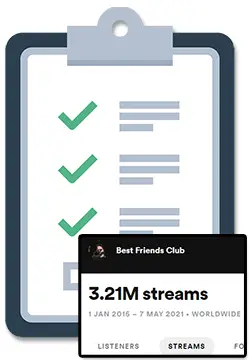If you’re wondering what Spotify’s streaming rules around playing songs on repeat are, I’ve done the research and have written about just that in this here article. 🙂
Spotify does count streams on repeat. As long as a song has been listened to for 30 seconds, Spotify will count 1 stream regardless of what song was played before.
So, if you (or your fans) listen to a song for 30 seconds and then listen to it again for 30 seconds, that will be counted as 2 streams.
However, it is safe to assume that Spotify will find any reason to limit how much they have to pay out as possible…
So, any suspicious activity (such as repeating songs after too many times without listening all the way through the song) could result in Spotify not counting the streams (or worse).
To learn more about how Spotify counts streams, just keep on reading, my friend. 🙂
Does Spotify Count Streams On Repeat In 2023?
In 2023, Spotify counts 1 stream when the song has been listened to for 30 seconds or more, regardless of what song was played before.
For example, if you listen to a song for 30 seconds and then listen to it again for 30 seconds, that will be counted as 2 streams.
However, artificially increasing a song’s play counts is against Spotify’s streaming rules and could result in that song’s streams being taken away or that song being removed completely.
Essentially, it is okay to listen to a song on repeat several times but having a song on repeat for hours and hours (or even days) may be crossing the line of what is acceptable for Spotify.
In fact, ‘On Repeat’ is one of Spotify’s algorithm playlists, so they clearly encourage repeated listens and actively track this kind of user behavior.
Spotify looks at thousands of data points and can compare them to other user’s listening behavior and can easily take action if they think they need to. Fighting and not paying for artificial streams is in their business’s best interests after all.
So, in summary: listening to a song on repeat as a casual listener is okay, but repeatedly streaming songs inorganically in an attempt to game the system is not (there is a more legit Spotify algorithm hack for that).
Could I earn royalties on Spotify by streaming my own music on repeat?
It is possible to earn Spotify royalties by streaming your own music on repeat. However, considering that Spotify pays anywhere between $0.00331 and $0.00437 per stream, you would need to stream your own music thousands and thousands of times to make just a few dollars.
In addition to this, the Spotify Terms and Conditions (that you must agree to in order to use Spotify) mention that you are not allowed to artificially increase play counts (Section 9, point 8).
Considering that playing the same song over and over for days could be looked at as “artificially” increasing that song’s streams, I would not recommend doing something like this to increase your Spotify royalties.
Does Spotify count your own streams?
There is no reason to believe that Spotify does not count streams when you stream your own music.
You can actually test this yourself by putting on one of your songs in the Spotify app, and checking the “People listening now” number goes up in the Spotify For Artists dashboard.
…Yes, Spotify For Artists is useful for more than just Spotify editorial playlist submissions. 😉
How does Spotify detect fake streams?
Spotify can detect fake streams by looking for unusual behavior when compared to Spotify’s standard user listening behavior. For example, Spotify may consider a playlist to be fake if there are not more streams than listeners (ie: users are only listening to each song once).
Remember that Spotify has a lot of data on its music and how its users interact with that music. They can use this data to notice when things look artificial.
For more on the downsides of suspicious playlists, check out my article on Spotify Jedi.
Can Spotify Take Away Streams?
Spotify can take away streams if Spotify believes any streams are coming from fraudulent accounts or if Spotify has detected “artificial streaming”.
The Spotify Terms and Conditions (that you must agree to in order to use Spotify) mention that you are not allowed to artificially increase play counts (Section 9, point 8).
Violating those terms allows Spotify to take action in the form of:
- Taking away the artificial streams
- Removing the song with artificial streams
- Removing your artist profile from Spotify
To learn more about how this works and how you can make sure it doesn’t happen to you, check out my article: Can Spotify Take Away Streams?
What To Do If Your Spotify Streams Went Down
When you are checking your Spotify stream counts, you actually may notice that they have went down from where they were before. In some cases, you may even see them hit 0.
Generally, there are 2 reasons that this can happen. The first is just temporary issue and the other is, unfortunately more permanent.
Spotify stream counts will go down:
- Momentarily while they are in the middle of updating stream counts
- Permanently if Spotify believes any streams are coming from fraudulent accounts
The first reason is really just a technical glitch in their system and means that your streams will most likely be updated in 30 – 60 minutes. However, the second reason is much more dark and sinister.
To learn more about this, check out my article called Help! My Spotify Streams Went Down (& How To Fix It).
…The Worst-Case Scenario
If Spotify thinks that you have been getting fraudulent streams there are essentially 3 things that might happen:
- Only the fraudulent streams get removed
- Your entire song gets removed
- You get kicked off your music distribution service
Spotify is taking the issue of fraudulent streams more seriously every day. With more and more artists complaining that they are getting kicked off, it looks like the punishment is getting worse and worse.
If you do get kicked off, you can contact Spotify or contact DistroKid (or your distributor) but, unfortunately, you may need to start looking for a new music distribution service entirely.
My top suggestion for a music distributor is definitely DistroKid, however, I’ve compared DK to other popular services if you are in the market for a new digital distributor.



